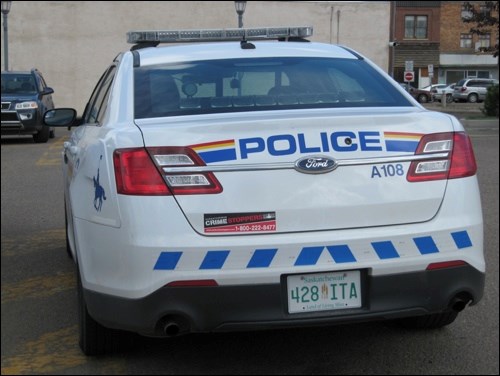Some help is on the way for those seeking to reduce crime in the rural areas in the province.
The announcement was made Tuesday in Regina of the creation of a new protection and response team, or PRT, focused on reducing crime in rural Saskatchewan.
The move was announced Tuesday by Justice Minister and Attorney General Gordon Wyant and by Battlefords MLA Herb Cox in a news conference in the capital.
The new PRT comes in response to the recommendations by the Caucus Committee on Crime chaired by Cox, whose report was submitted to the Ministry of Justice.
The provincial response team will consists of 258 armed officers who will have arrest and detention powers, according to the province.
Among those will be 120 police officers from RCMP and municipal police services. Of those, 60 are currently deployed to the Combined Traffic Services Saskatchewan Initiative, 30 will be new positions, and 30 re-purposed police positions currently funded by the ministry.
Those will be integrated with 40 Ministry of Highways Commercial Vehicle Enforcement Officers with expanded powers; and 98 Ministry of Environment Conservation Officers.
According to Wyant, the PRT will “expand on the success of blended policing models,” he said. Wyant said at the news conference the PRT will improve police response, enhance uniform visibility, increase enforcement of drug trafficking and increase safety on Saskatchewan roads.
In speaking with the News-Optimist, Cox said a common theme his committee heard was “the visibility of RCMP in rural areas, and response times in rural areas.”
“The 258 new members that are going to be in this PRT, certainly that’s going to alleviate that.” He said that using conservation officers and highway traffic officers will also help in cutting down in the response time.
“Having more vehicles, more uniforms out in all areas of our province is certainly going to be a deterrent to crime in our opinion.”
According to Cox, all of the PRT members will be trained similarly and carry sidearms.
In total, the caucus committee on crime made eight recommendations. Some of those include: ensuring RCMP resources and personnel are used effectively in rural areas; providing more funding for on-reserve programming and services; and to review legislation to allow municipalities to jointly administer alternative policing programs, among others.
On the latter point, Cox said the committee heard from a couple of rural municipalities about difficulties they were encountering in getting together to hire a community safety officer. In response, the regulations are being changed to allow those sorts of initiatives to happen.
With respect to on-reserve, a couple of reserves have launched a HUB model and there are plans to partner with Aboriginal leaders on a gang strategy.
Overall, the recommendations are in line with what the committee heard from people, Cox said.
At the news conference Tuesday, Cox said there were recurring concerns raised to the committee about visibility, the increase in crimes with violence, the high amount of crime involving drugs, increased gang activity, and requests to tighten up legislation to be tougher on repeat offenders.
“The response that we had from the public very much informed the decisions that we made,” said Cox.
“We went into this thing with no preconceived notions about what we wanted to hear.”
The caucus committee began consultations in November of 2016, and toured 10 communities over a period of 12 days, including North Battleford.
Despite the budgetary pressures, money has been set aside in the 2017-18 provincial budget to implement the committee’s recommendations. A total of $1 million had been set aside by the Ministry of Justice and SGI will be providing an additional $4.9 million, going towards funding the PRT.
As for rolling out all these changes, Cox believes some of the responses can be implemented this fall, but others might take several more months to get implemented.
What it will depend on, Cox said, will be the training needed and what facilities are available for that. According to the province the PRT participants will be receiving a comprehensive training curriculum regardless of their designations.
“It’s going to vary, but the training is very important,” said Cox. “We can’t send all these people out without proper training.”
Wyant has pledged the staffing and training will start immediately, so that it can be fully staffed within this fiscal year.
In the news conference in Regina, Cox said his committee were pleased with the response of the Ministry of Justice to the recommendations that were made.
“This announcement today is not the destination, it’s a journey, and we are going to continue to work on it,” Cox said at the news conference.
Wyant publicly thanked the Caucus Committee for their work.
“The government is committed to addressing the safety needs of Saskatchewan people and the PRT will help us ensure the continued safety of the province’s people and their communities,” Wyant said. “My sincere thanks to MLA Cox and his committee for all their work in helping address this significant issue, and all those in the room who have assisted in helping draft these recommendations.”




